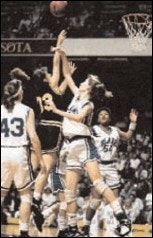Title IX complainants increasingly target high schools

Every month, Susan True, an assistant director with the National Federation of State High School Associations, receives a report listing the Title IX-related complaints received by the Women's Sports Foundation in East Meadow, N.Y. As few as two years ago, three-fourths of the calls contained in those reports were related to college programs. Today, 72 percent of the 50-some Title IX-related calls target at high schools.
For years, the prime battleground of gender equity in sports was the college campus, as female athletes fought through the courts and the media to achieve equality. Apparently, a generation of parents and soon-to-be parents was watching and listening. Now, emboldened by recent Title IX victories on the high school level in states like Kentucky, Nebraska, Louisiana and Montana, parents, educated by the media attention given to Title IX's 25th anniversary last year, are taking what they've learned and forcing school districts and high school associations to pay attention to gender equity issues in their own front yard.
Neena Chaudhry, a staff attorney at the Washington, D.C.-based National Women's Law Center, agrees that the impetus behind the increase is parents - in particular, mothers who may have experienced discrimination when they played sports in high school and college - who know their rights and, more importantly, know the law. "I think parents and students are definitely becoming more aware," Chaudhry says. "I get calls all the time from highly educated parents who know what Title IX is, know what's required of the school and aren't afraid to bring their concerns forward."
A recent court ruling may unleash even more complaints directed at high schools in the coming months. This February, the National Women's Law Center won a landmark case against the NCAA (Smith v. NCAA) in which the Third Circuit Court of Appeals ruled that, as an agent of schools that receive federal funds to administer educational programs, the NCAA is an indirect recipient of such funds - and therefore subject to Title IX. That ruling is likely to have a dramatic impact on high school athletic associations, which are also indirect recipients of federal funds directed at high schools.
"A lot of high school athletic associations have believed that they won't get hit," says Kristen Galles, a Virginia-based attorney who's a veteran of countless Title IX cases, including the 1995 case that won a fast-pitch softball program for female athletes in three school districts in Nebraska. "They've seen it as a college issue, not a high school issue - 'Nobody's going to want to sue because they won't get a scholarship out of us,' " she says. "But I think more and more of them are going to get hit."
If they do, some states may be more prepared to deal with complaints than others. The majority of state associations and school districts still have no formal program in place to monitor Title IX compliance. In fact, as True suggests, there may be a fair number of high school athletic administrators out there "who simply don't know what the requirements are." In recent years, high school associations in states like Ohio and Minnesota have developed proactive risk-management materials to help their members perform self-examinations to catch possible Title IX violations before lawsuits are filed. In states like Florida, associations have adopted proportionality tests to make sure the number of sports their schools offer to males and females balance out. That's a good start, but it still leaves school districts and athletic associations vulnerable to Title IX lawsuits in key areas like equal pay and benefits for coaches of girls' sports, or equivalent facilities. The latter have proved particularly acrimonious, as the case of the successful complaint filed last year by an angry parent over an Arizona school district's refusal to include a girls' softball field in plans to upgrade a sports complex [see "Battlefields," March 1997, p. 16] convincingly demonstrates.
"One of the things school districts keep thinking is that it's about equal participation - oh, gee, if they cut a team or fail to add a team they're in trouble," says Galles. "But the whole other aspect of Title IX is dealing with equal treatment and benefits - locker rooms, scheduling, uniforms and equipment. They just totally forget that's part of it, and I think that's where the next wave of litigation is going to be."
One thing is certain - a growing number of plaintiffs stands ready to remind them. In Virginia, the Virginia High School League is currently facing a lawsuit brought by a group of female students over a scheduling issue. Twelve plaintiffs are charging that the league's unusual system, in which girls play basketball, volleyball and tennis in different seasons depending on their school's classification, is discriminatory - in particular because classification is dependent on the size of the school and is subject to change every two years, depending on student enrollment. In the case of the plaintiffs, the athletes were attending a class-AA school, playing field hockey in the fall, volleyball in the winter and tennis in the spring. When enrollment was increased and their school was bumped up to class-AAA, which plays each of those sports in the fall, the plaintiffs were suddenly forced to choose between them. Also at issue are potentially diminished scholarships and recruiting opportunities for girls playing sports in odd seasons.
So far, debate over the merits of making sports scheduling in Virginia schools uniform for both boys and girls has been civil, although both sides remain firmly fixed in their positions. In order to prove Title IX compliance, the VHSL recently conducted a statewide survey of female athletes that showed the majority of female students actually seem to prefer things the way they are. "Under Title IX, the idea is that if you want to increase and encourage participation in athletics, you find out what the girls want and then you give it to them," says Jim Johnson, the attorney representing the VHSL in this case. "Both the Office for Civil Rights regulations and case law support this."
Mary Bauer, the legal director of the ACLU's Virginia branch, which is arguing the case, isn't convinced by the VHSL's data. "We've said all along that it was likely, depending on how you asked the question, that lots of girls would say that the system was OK, because these girls are playing particular sports, and they've structured their lives around when those sports are played. That seems to them the norm," says Bauer. "But we have these girls who are going along, playing sports, and all of a sudden they're told they can no longer do that. That never happens to boys in the Virginia system. There's just no way to argue that such a system is preferable to the system boys have."
In this case, the plaintiffs may have legal precedence on their side. In 1992, a group of Arizona girls' basketball players successfully forced their state interscholastic association to change the girls' basketball season from spring to winter, so the girls could take advantage of scholarship and college recruiting opportunities.
As this is written, the Virginia case has been stayed until early June, when a judge was to set a date for trial if an agreement could not be reached. Recent case history shows that most Title IX complaints filed against high schools are settled before going to trial, but whichever way this case is decided, it looks like it may be just one of many headline-grabbing Title IX cases in 1998. Lawsuits could be filed against state athletic associations in Connecticut, Vermont and Wisconsin, where parents are petitioning school districts to add women's hockey programs.
And the wave of lawsuits isn't likely to stop at the high school level. Already, girls who are years away from becoming teenagers are attempting to expand the definition of Title IX to rectify perceived inequalities. In April, in the first Title IX lawsuit to target a municipality, a group of Los Angeles, Calif., girls who play in the West Valley Girls Softball League have sued the city for forcing them to play on substandard fields while their male Little League counterparts play on fields with electronic scoreboards and concessions stands. The youngest plaintiff in the suit is five years old.




































